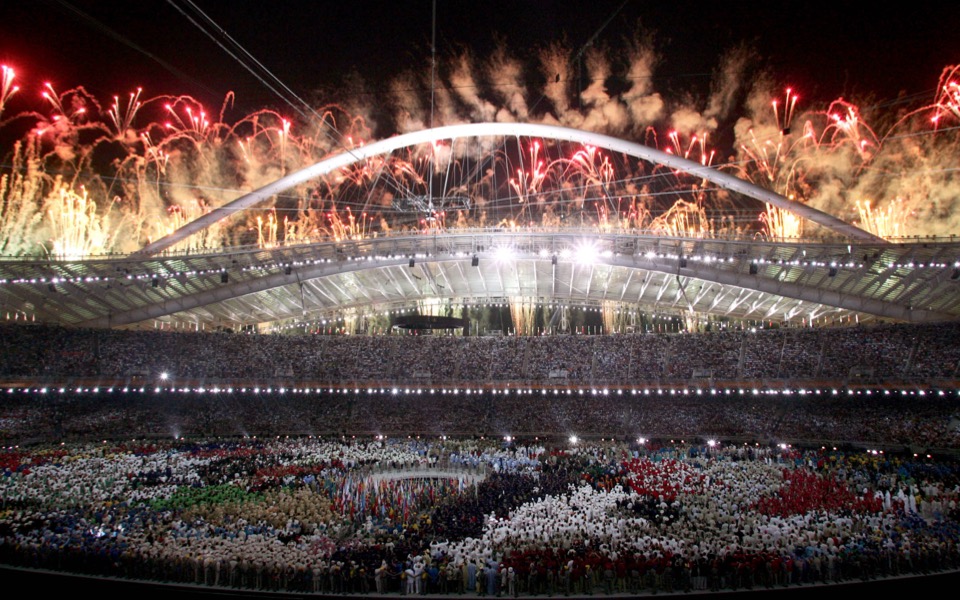Athens 2004, seen 15 years later

This month, we’re taking a moment to remember the success of the Athens 2004 Olympics. We hope our friends in Athens and all Greeks do so as well. We had the privilege of witnessing this success close up, as advisers to the Athens 2004 Bid and Organizing Committees. We’ve not been back to Greece in these 15 years, and appreciate we have missed a very, very difficult period. But perhaps our distant perspective can be of some use now.
What we saw, with our own eyes, was something deeply impressive and not to be forgotten or dismissed: the sight of Greeks coming together and delivering a world-class event. You succeeded because of Greek skill, Greek character and Greek work. And, yes, your ability to do things at the last minute. This wasn’t foreordained. The bid to win the 2004 Olympics was not a cinch. Rome had the inside track and was running ahead in 1997. We were two Americans visiting Athens for the first time that year, working with George Stephanopoulos for the Athens 2004 Bid Committee.
We came to Zappeion and joined a team of highly talented people in an environment that was familiar to us in some ways from our work in US presidential campaigns and in the White House (high pressure, complex issues, lots of press attention) and unfamiliar in others (Athens, Greek pacing and humor, the International Olympic Committee).
Gianna Angelopoulos-Daskalaki was the driving force. She deserves the wreath. She led the effort, and we were captivated by her energy and talent from the start. Great leaders build great teams, and that is what she did. The Bid Committee and Athens Olympic Organizing Committee (ATHOC) were filled with characters still strong in our memory, characters who could easily populate a Netflix miniseries based in Nea Ionia. Big personalities, complex personalities, funny people, intense people. And all these characters were linked by an action-driven plot; they worked to get things done. And they succeeded.
How? By professionalism. Direct and clear communication. Confidence combined with curiosity about exactly what was needed. A team of talented young people who wanted to win by getting it right and working hard. It’s hard to articulate it, but it wasn’t being driven by insecurity or a chip on the shoulder – it was being driven by competitive confidence.
We had heard stories of Greek problems, of past bids for the Games gone awry, of negative national traits. We saw the opposite. We were met with humor, patience and good will. Philoxenia was quite for real. Competitions, athletic or professional, reveal a lot. When Rome provoked, Greece showed itself to be big not small. No matter how much the international press poked, Greece focused on preparing for the Games.
Yes, there were questions and doubts. Would the traffic plan actually work? Would the Meltemi in fact cool things off? (Tokyo’s recent heat wave a year before their 2020 Games brings back many worried memories.) The young vendor on the Acropolis who looked at our accreditations for the Bid Committee during the World Athletic Championships in 1997 and quietly asked, “Do you think we could really have the Games be a success?”
The dozens of meetings with the IOC in the runup to the Games were a chance to display the full range of Greek talents and set the table for the resounding “yes” to the young vendor’s question. We saw the meticulous preparation for those meetings in the years before the Games. Dozens of planning questions about every detail of the meeting, through the careful development of materials and practicing, through gracious but tough negotiating. The IOC had some leverage, but when there was a fight it wasn’t really a fair fight. The more talented team was Greek.
What made it all work was that so many exceptional Greeks responded to confusion with planning, to provocation with discipline, to doubt with results. It wasn’t all sweetness and roses – members of the team did compete for power, but they did so by trying to outperform not undercut each other. Talent was rewarded. Many young men and women seized the opportunity to excel.
One of the great privileges of our time with ATHOC was watching people we met as interns or assistants rise to manage departments, venues and operations during the Games. We are sorry to learn of the loss of Michalis Zacharatos, who epitomized so many qualities in his work. He was a talented spokesman, a gifted strategist, a creative energy and a fierce and effective advocate for Greece.
The 2004 Olympics were indeed magical and dreamlike, but also a long time ago. Both hyperbole and nostalgia at this moment now miss the point. The ancient Olympics did not usher in abiding peace between city-states any more than do the modern Games between nations. The Games of the XXVIII Olympiad did not prevent the problems that have followed (nor did it cause them). The arc of preparation was not smooth; we do not mean to minimize the costs that were paid by Greeks before and after 2004.
But to our friends in Greece, we send a message born of our direct if distant experience. We hope you will remember and honor your success then as we do now. As you set the course for Greece for the next decades, it would be a practical mistake of the first order to forget or dismiss the accomplishments of Athens 2004.
Mark Steitz and David Dreyer are senior principals at TSD Communications, a communications consulting firm based in Washington, DC, that worked on the Athens 2004 Bid and for the Athens Organizing Committee.




